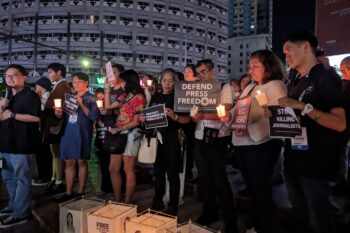VALENCIA CITY (MindaNews/26 June) – The National Irrigation Administration (NIA) not only lacked the expertise to implement the fertilizer subsidy program, it also ignored the right and the capacity of the local government to do it, City Agriculturist Gerson Salvan said.
Smelling a scam, the provincial board is looking into the fertilizer subsidy program.
Salvan said programs of the national government must be well coordinated with the local government, something that was not followed in the NIA’s distribution of organic fertilizers to members of irrigation associations here.
The NIA 10 subsidy package involves a fertilizer and pesticide distribution to farmers in Region 10, including those in Bukidnon, Lanao del Norte, Misamis Occidental, and Misamis Oriental. But the program zeroed in on members of irrigators’ associations, which explains NIA’s involvement.
A total of 1,340 farmers from the four provinces of Region 10 received a total of 18,317 bags of fertilizers and 6,104 bottles of pesticides.
The program is part of the national government’s FIELDS program, which integrates activities of related agriculture agencies to make the country “rice-sufficient,” said Julius Maquiling, NIA 10 regional director.
FIELDS stands for the six areas of support the national government pledged to farmers—Fertilizer, Irrigation and Infrastructure, Education and training of farmers and fisherfolk, Loans, Dryers and other post harvest and facilities, and Seeds of the high-yielding, hybrid varieties.
The pledge costs P43.7 billion nationwide. Maquiling said they were able to access P30 million from the project.
The Fertilizers and Pesticides Authority (FPA) has taken samples for laboratory testing of organic fertilizers distributed by the NIA following an inquiry by the Provincial Board on a possible scam.
Provincial board member Glenn Peduche, a rice farmer and merchant from rice-producing Valencia City, in a privilege speech at the Sangguniang Panlalawigan on June 2 questioned, among others, the quality of fertilizers NIA distributed to the farmers.
He brought samples from Valencia City to show the fertilizers were of “substandard quality.”
Peduche told colleagues the fertilizers NIA distributed do not appear to be made of genuine organic materials.
Salvan told MindaNews Friday the NIA did not coordinate on anything with the City Agriculture Office. He said the NIA went directly to the irrigators association.
“I now wonder about process of the national government in implementing programs in communities. What is the wisdom of this?” he asked.
The national government, he added, seemed to be disregarding the Local Government Code.
“It is the City Agriculture Office who is at the local scene, what is the NIA doing in an organic fertilizer project (without even coordinating with us)?” he said.
Salvan, an agricultural engineer and a doctor of management, said the NIA has no expertise to provide technical support or check quality of the subsidy fertilizers.
Salvan said one implication of NIA’s action is that it will not know if the project will be effective.
It turned out to be a problematic project on the ground, according to Nixon Apsay, president of the Sinayawan G-6 Lateral Irrigators Association, one of the 42 members of the Pulangi River Irrigation System (PRES).
Apsay told MindaNews the organic fertilizer that reached them had dried up and was no longer effective for their ricefields.
Apsay was the farmer who alerted Salvan about the problem. He asked Salvan to attend one of the irrigators meetings with NIA to confront them about the problem.
“We were happy to have received organic fertilizers. But no thanks. It has no effect. The others who received it did not apply it to their farms anymore,” Apsay said in his farm in Sinayawan village.
Salvan said what he could not understand is why the national government did not coordinate with the local government when the city had advocated for organic farming for years.
“I am afraid this will discourage farmers from converting to organic farming,” he said. (Walter I. Balane/MindaNews)
